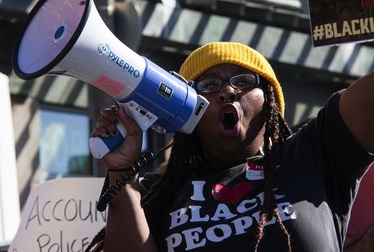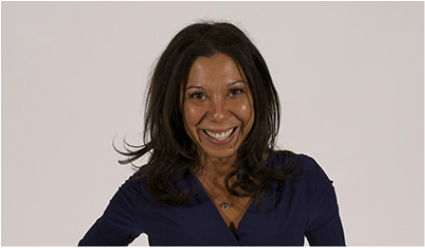 Photo By Alexandra Wimley /Daily Free Press Staff Photo By Alexandra Wimley /Daily Free Press Staff Daunasia Yancey is black, lesbian and powerful. Credited with leading a protest intended to disrupt a tree lighting ceremony that took place the day after the disappointing Eric Garner decision, Yancey has been dubbed the new face of Boston’s civil rights movement by Boston Magazine. They just might be right. Yancey is young, but she’s held a number of influential positions. She has served on the Board of Directors for the Boston Alliance for Gay Lesbian and Transgender Youth (BAGLY) and the National Youth Advocacy Coalition (NYAC). According to her LinkedIn page, her work has been featured in the documentary, Secret Survivors and she has been honored with the Colin Higgins Foundation’s National Youth Courage Award and the Fenway Health Trailblazers Award. It becomes clear a few minutes into a conversation with her on a bright Sunday afternoon via phone, that if Yancey believes in something, she’s going to face it or change it, head on. “If I believe it, it must be true,” she said. It’s easy to believe her.  Jabria Greene, former Blueprint Conference attendee and panelist for the 2015 Blueprint Conference. Jabria Greene, former Blueprint Conference attendee and panelist for the 2015 Blueprint Conference. Sisterhood is at the center of the 9th Annual Blueprint Conference for Girls organized by the National Alumnae Association of Spelman College, June 13-14 at Simmons College. Eighteen-year-old Jibria Green attended the conference the last three years and is looking forward to participating in this year’s conference. In the fall she is headed to Northeastern University to study political science on a full financial ride, and though the Blueprint Conference isn’t the only reason she’s so grounded, Green does credit the conference with providing her lasting memories of a safe space where one can be themselves. “They [the women at the conference] created an atmosphere where it was really about sisterhood. I really wanted to be around them and be a better me,” she said. The young activist in the making is currently a student at the Codman Academy Charter Public School in Dorchester, MA. She’s a soccer player and a lover of the arts, but lately, Green has found herself getting more involved with issues of racial injustice. “You know what’s interesting, I have been getting more involved. I worked with the NAACP doing volunteer work. Everyone can’t be in the background,” she said. Green comes from a large family and has five siblings whom she looks up to. “They are the most influential people outside of my mom and dad. I think they made it OK for me to strive to do the things that other people deem out of reach. They held me to a very high standard. Without that, I wouldn’t have pushed myself. I wouldn’t be able to fail at things and be comfortable in my discomfort. It’s about the people before me and the people after me,” she shared. This multi-talented teenager has big plans to change the world. She’s considering becoming a lawyer so she can familiarize herself with the judicial system within which we are all forced to function. She’s concerned with racial injustice as well as the portrayal of people of color in the media, and is looking to gain the knowledge and the power to change things. Green shared how powerful it was to be at past Blueprint Conferences, surrounded by women of color whose mission it was to help each other succeed. It looks like the conferences are working. Green’s life philosophy: “I hope for the best and I plan for the best.”  Malia Lazu, CEO and Co-Founder of Future Boston Alliance. Malia Lazu, CEO and Co-Founder of Future Boston Alliance. Talking to activist and innovator Malia Lazu on the phone for the first time is akin to conversing with an old friend. Her personality is big and warm and her conversation is peppered with threads of altruism and a great big dash of hope. The black, Puerto-Rican and Italian Emerson College Alum is the executive director and co-founder of Future Boston Alliance, an organization that advocates and supports the progressive and cultural growth of the city. One June 14, she will make an appearance on an all-female keynote panel at the 9th Annual Blueprint Conference for Girls organized by the Boston Chapter of the National Alumnae Association of Spelman College. This year’s theme #BlackGirlsMatter is in line with the nation’s highly publicized racial unrest that has culminated in the deaths of several black men and women by police. But the deaths and/or abuse of young black women doesn’t generate the same response as those of black men. Streets aren’t filled with thousands of protestors all over the nation when a black woman is raped or killed by police. The Washington Post reported on a rally that never materialized due to lack of participation over the death of Natasha McKenna who, after several days in a coma, died after being stunned multiple times with a Taser by cops. Rekia Boyd was shot to death by an off duty officer in Chicago and her death failed to stir the country’s interest like the deaths of Michael Brown, Eric Garner or Trayvon Martin. The women behind the Blueprint Conference want to show the more than 130 girls that registered for the conference that they do matter and that they are loved. For two days, conference participants will be surrounded by educators, activists and other students reinforcing this message through workshops, activities and lectures. Recently, Lazu—who has been profiled by The Boston Globe and Boston Magazine and has managed campaigns for Grammy Award-winner and civil-rights Activist Harry Belafonte and novelist Walter Mosley—took some time to share her thoughts on leadership, activism and why conferences like these matter. |

